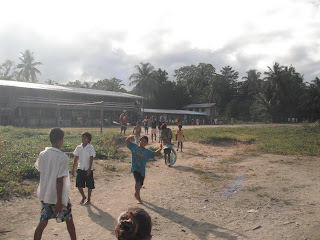Today I resolved to oust my bosses in an attempt to alter the power balance in the communities with whom I’m working. Bear with me and I’ll come back to this later.
Yesterday I arrived in the village of Cookson on the island of Wagina. The Wagina community is one of three partner communities in the Arnavons Community Marine Conservation Area (ACMCA) for whom I’ve been working. It’s a relatively new community – the inhabitants arrived in the 1960s as refugees from the French and British nuclear testing on the Christmas Islands in Kiribati. Interestingly, the Wagina community is the main source of poachers at the Arnavons, and that’s where I come in.
 |
| Turtle soup. |
No, I didn’t come here to crush skulls and threaten prospective poachers, though I am pretty tough. My job is to figure out how the conservation area might benefit the communities and then to make that happen so that they will hopefully value the conservation area and stop poaching. One might have thought that having a source population for fish and turtles – the main protein foods here – might count for some sort of benefit, but apparently that’s not the way it works. I’ll come back to this later too.
Today was to be one big day of story telling. I started with the nurse who told me about the health issues in the area, I then spoke to the police officer who made excuses for not attempting to stop poaching, then I chatted with one of the ACMCA management board representatives for Wagina who described his plans to implant a secret police post in the conservation area and use radar to detect approaching boats of potential poachers, and finally I went around to the houses of all the elders and social group representatives – those who were awake, anyway – and spoke to them about what they thought I might do to help the community.
 |
| Its not child labour, its just helping out. |
While few of them actually knew what the ACMCA was, they were keen see the odd change in the community. The only idea that really took hold though, was the possibility of selling some local crafts to tourists at the Arnavons and the vague idea of getting tourists to visit Wagina itself. Armed with this understanding of local priorities, I put together some notes for a little talk that I was to give at the Big House this evening.
The meeting was scheduled for 7pm, though naturally, everyone else (only about 30 people) turned up late and we didn’t start the meeting until after dinner at about 9. Even then, it wasn’t until after I had finished speaking and we were chatting casually that people actually started asking questions about the issues at hand. What they were most concerned with was that they hadn’t heard much – if anything – about what the project was doing; there was simply no feedback from their representatives on the board of management. While this was disappointing to me, I was stoked that they too were outwardly disappointed – it takes a lot for a Solomon Islander to actually complain publicly about something. The overwhelming feeling was that they had had their fishing grounds confiscated, not to ensure food security as I’ve suggested that it might, but for a fun little project for some of their leaders who were on the board of management, hence the problem with poaching.
 |
| Schools out... at 11am. |
By the end of the meeting I had a long list of things to do before I come back to Wagina next time. Although it’s not on the list, my most important task for the next few weeks will be to talk to various community leaders about the importance of having ACMCA board representatives (who are often appointed by the chiefs) be accountable to their communities.
Here I should note that (a) the communities aren’t altogether ecstatic about the performance of their board representatives and are unlikely to want them kept in the job, and (b) these representatives are essentially my bosses over here. Returning to my original point then: what this means, if I succeed is that I will, in effect be putting several of my bosses out of a job and paving the way for changes to the power balance in local community governance.
Wish me luck... And don’t tell my boss.
 |
| Sunset over the Cookson sea-shore. |
No comments:
Post a Comment